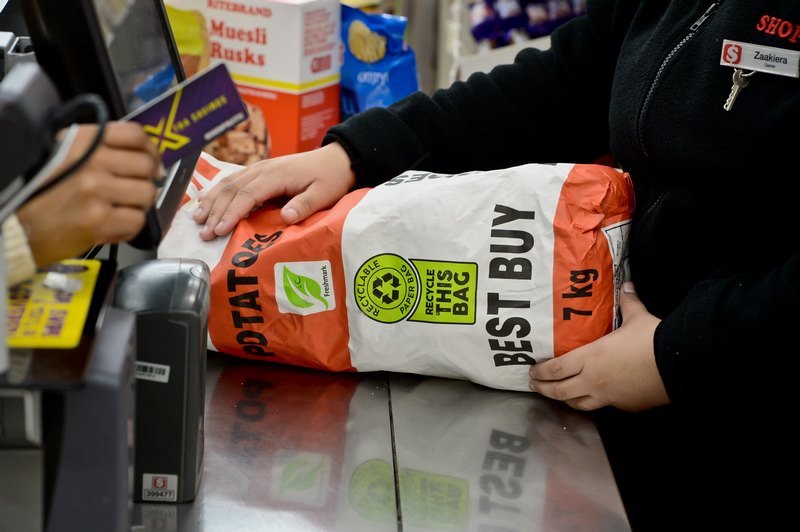Imagine a future where your weekly grocery run helps combat pollution, support local livelihoods, and protect South Africa’s environment—all without spending a cent more. Thanks to Shoprite’s innovative new potato packaging, that future is already here.
Shoprite, Africa’s largest food retailer, has unveiled a recyclable 7kg potato bag that marks a significant step forward for sustainable retail in South Africa. Starting in May 2025, shoppers across the country will find this new packaging in more than 1,400 Shoprite, Checkers, and Usave stores nationwide.
This isn’t just another packaging tweak. It’s a bold leap toward reducing the 18,600 tons of potato packaging waste that clogs South African landfills annually—and it’s doing so without adding cost to consumers.
Traditional Potato Bags: A Hidden Environmental Burden
For decades, the standard plastic-and-paper composite used in South Africa’s potato bags posed a significant problem. These bags were nearly impossible to recycle due to their mixed materials, leading to thousands of tons of waste ending up in landfills year after year.
Although they served their purpose of keeping potatoes fresh, they carried a hidden environmental cost. Waste from these non-recyclable bags added strain to already overburdened landfill sites and deprived informal waste pickers of potential income due to their unrecyclable nature.
An In-House Innovation with Big Potential
Unlike many sustainability initiatives that rely on external consultants or imported solutions, this one came from within. The eco-friendly potato bag is the result of a forward-thinking project by five Shoprite employees participating in a leadership programme at the Gordon Institute of Business Science (GIBS).
The team was challenged to reimagine one of the most common items on South African grocery shelves—the humble potato bag. Partnering with international paper experts, they engineered a recyclable alternative that meets South Africa’s current waste and recycling infrastructure requirements. That means no extra facilities, expensive machines, or complicated logistics are needed to make this solution work.
Supporting Local Economies and Informal Recyclers
The potential impact of this innovation stretches far beyond waste reduction. If adopted more broadly across the fresh produce sector, this single packaging change could generate over R22 million annually for South Africa’s informal waste-picking economy.
By replacing unrecyclable materials with recyclable paper, the new bags can now be collected, sorted, and sold by informal recyclers—creating economic opportunities for thousands of individuals who rely on waste collection for their livelihood.
It’s a closed-loop solution: consumers get their groceries in sustainable packaging, waste collectors earn more income, and less rubbish ends up harming the environment.
Why Shoppers Should Care
Many people want to shop more sustainably, but too often, the options are either inconvenient or more expensive. This is what makes Shoprite’s move so important—it makes the sustainable choice easy, affordable, and widely accessible.
By simply choosing potatoes in these recyclable bags—something you were already buying anyway—you’re now making a positive impact on:
- The environment – helping reduce landfill waste.
- Local jobs – enabling waste pickers to earn more from recyclable material.
- Innovation in South Africa – backing home-grown, forward-thinking solutions.
A Milestone for the Retail Industry
This initiative signals more than just a packaging change—it marks a shift in mindset for the retail industry. While many sustainability efforts are reactive, this one is proactive and deeply integrated into Shoprite’s broader environmental goals.
In recent years, the group has made headlines for championing renewable energy, reducing food waste, and cutting back on single-use plastics. The new recyclable potato bag fits perfectly into this trajectory and sets a new standard for practical, scalable sustainability in retail.
Zero Change in Price, Maximum Change in Impact
One of the most powerful aspects of this initiative is that it costs the consumer nothing extra. You’re still paying the same price for your 7kg bag of potatoes, and you’re getting the same shelf life and product quality.
What’s different is the impact: with every bag sold, less waste is produced, and more opportunities are created for informal recyclers. There’s no need for you to bring reusable bags or pay a premium for “green” products. The change happens automatically—just by shopping as you usually do.
Growing Demand for Sustainable Packaging
Shoprite’s timing couldn’t be better. Consumers around the world—and in South Africa—are increasingly prioritizing eco-friendly options. According to NielsenIQ, nearly 73% of global consumers say they would change their consumption habits to reduce environmental impact. Closer to home, South African shoppers are also showing stronger interest in companies that align with sustainable values.
This is no longer a niche market trend—it’s a mainstream expectation. And with this initiative, Shoprite is proving that it’s listening and responding.
What Comes Next?
The launch of this recyclable potato bag is just the beginning. As more retailers and manufacturers begin to feel the pressure to reduce their environmental impact, this move by Shoprite could become the blueprint for future innovation.
Imagine similar changes to other commonly purchased items: onions, butternut, carrots, apples. A simple shift in packaging across just a few products could drastically reduce plastic waste in South Africa and create even more work for informal recyclers.
There’s also hope that this model could be adapted for other regions in Africa, where similar challenges around waste and unemployment exist.
Final Thoughts: Small Change, Big Difference
Shoprite’s recyclable 7kg potato bag may seem like a small innovation, but it’s delivering big results. It’s proving that sustainability doesn’t have to be expensive or difficult—it just needs to be smart, collaborative, and community-minded.
This initiative blends innovation, environmental stewardship, and social impact into a single, tangible product that thousands of South Africans interact with every day.
So next time you walk into a Shoprite, Checkers, or Usave store, look out for that new potato bag. By placing it in your trolley, you’re not just buying groceries—you’re joining a movement toward a cleaner, fairer, and more sustainable future.

Leave a Reply